Practice with the help of enVision Math Common Core Grade 3 Answer Key Topic 15 Attributes of Two-Dimensional Shapes regularly and improve your accuracy in solving questions.
enVision Math Common Core 3rd Grade Answers Key Topic 15 Attributes of Two-Dimensional Shapes
Essential Question:
How can two-dimensional shapes be described, analyzed, and classified?
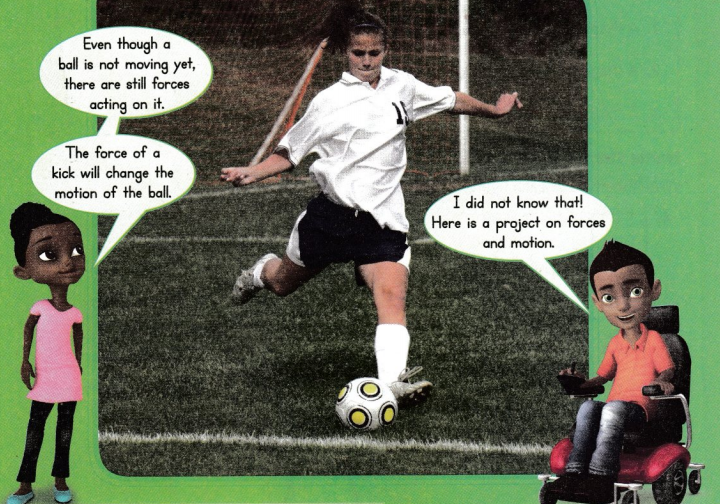
enVision STEM Project: Forces and Motion
Do Research Use the Internet or other sources to find information about forces and the motion of an object. What does a balanced force mean? What happens when forces are unbalanced?
Journal: Write a Report Include what you found. Also in your report:
- Give examples of balanced and unbalanced forces on objects.
- Draw a picture that shows force acting on an object and the result.
- Describe the shapes in your drawing.
Review What You Know
Vocabulary
Choose the best term from the box. Write it on the line.
- circle
- hexagon
- pentagon
- triangle
Question 1.
A shape with exactly 6 sides is called a _________.
Answer:
The shape with exactly 6 sides is called a hexagon.
Explanation:
In the above-given question,
given that,
the terms are circle, hexagon, pentagon, and triangle.
6 sides = hexagon.
hexagon is one of the two-dimensional shapes.
for example:
Question 2.
A shape with exactly 3 sides is called a __________.
Answer:
The shape with exactly 3 sides is called a triangle.
Explanation:
In the above-given question,
given that,
the terms are circle, hexagon, pentagon, and triangle.
3 sides = triangle.
triangle is one of the two-dimensional shapes.
for example:
Question 3.
A shape with exactly 5 sides is called a ___________.
Answer:
The shape with exactly 5 sides is called a pentagon.
Explanation:
In the above-given question,
given that,
the terms are circle, hexagon, pentagon, and triangle.
5 sides = pentagon.
The pentagon is one of the two-dimensional shapes.
for example:
Name Shapes
Write the name of each figure.
Question 4.

Answer:
The name of the figure is a square.
Explanation:
In the above-given question,
given that,
the figure has four sides.
so square has four sides.
the area of the square = s x s.
where s = side.
so the name of the figure is a square.
Question 5.

Answer:
The name of the figure is a rectangle.
Explanation:
In the above-given question,
given that,
the figure has four sides.
so rectangle has the four sides.
the area of the rectangle = l x b.
where l = length, and b = breadth.
so the name of the figure is a rectangle.
Question 6.

Answer:
The name of the figure is a triangle.
Explanation:
In the above-given question,
given that,
the figure has three sides.
so triangle has three sides.
the area of the triangle =1/2( b x h).
where b = base, and h = height.
so the name of the figure is a triangle.
Question 7.

Answer:
The name of the figure is a hexagon.
Explanation:
In the above-given question,
given that,
the figure has six sides.
so hexagon has six sides.
the area of the pentagon = p x a/2.
where p = perimeter, and a = anotherm.
so the name of the figure is a hexagon.
Shapes
In 8-11 write the number of vertices each figure has.
Question 8.

Answer:
The number of vertices = 3.
Explanation:
In the above-given question,
given that,
the figure is a triangle.
the highest or the top point is called the vertex.
the number of vertices = 3.
triangle has 3 vertices.
Question 9.

Answer:
The number of vertices = 4.
Explanation:
In the above-given question,
given that,
the figure is a quadrilateral.
the highest or the top point is called the vertex.
A polygon that has exactly 4 sides is called a quadrilateral.
the number of vertices = 4.
quadrilateral has 4 vertices.
Question 10.

Answer:
The number of vertices = 4.
Explanation:
In the above-given question,
given that,
the figure is a rhombus.
the highest or the top point is called a vertex.
A polygon that has four equal sides is called a rhombus.
the number of vertices = 4.
rhombus has vertices.
Question 11.

Answer:
The number of vertices = 6.
Explanation:
In the above-given question,
given that,
the figure is a hexagon.
the highest or the top point is called a vertex.
a polygon that has 6 straight sides and angles is called a hexagon.
the number of vertices = 6.
hexagon has 6 vertices.
Question 12.
How many faces does a cube have?
A. 3
B. 4
C. 5
D. 6
Answer:
Option D is the correct answer.
Explanation:
In the above-given question,
given that,
a cube has 6 sides.
cube also has six faces.
they are top, bottom, left, right, up, and down.
so option D is the correct answer.
Question 13.
How are squares and triangles the same? How are they different?
Answer:
The square and the triangles are the same.
the square and the triangles are different.
Explanation:
In the above-given question,
given that,
the squares and triangles are the same:
when they both have common names that do not indicate the number of sides.
they have four right angles.
the squares and triangles are different:
when they both have different side lengths and angles in a triangle.
so both the squares and rectangles are the same and also different.
Pick a Project
PROJECT 15A
Where do professional baseball players play their games?
Project: Create Quadrilateral Riddles
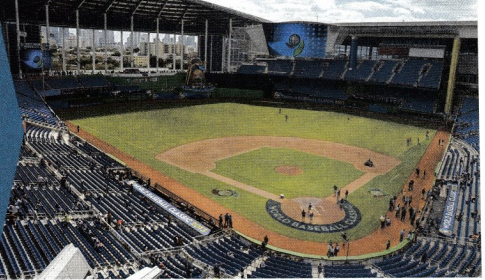
Answer:
The professional baseball players play their games on baseball grounds.
Explanation:
In the above-given question,
given that,
the baseball players will play their games on baseball grounds.
baseball is a bat-and-ball game played between two opposing teams who take turns batting and fielding.
the game proceeds when a player on the fielding team, called the pitcher, throws a ball which a player on the batting team tries to hit with a bat.
PROJECT 15B
How are books measured?
Project: Collect Data about the Shapes of Books
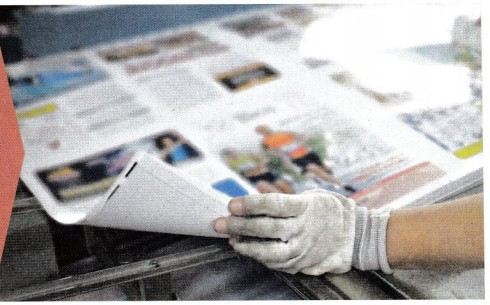
Answer:
The books are measured in many ways.
Explanation:
In the above-given question,
given that,
the shape of the books is measured in many ways.
the square and the rectangle.
the area of the square = s x s.
where s = side.
the area of the rectangle = l x b.
where l = length, and b = breadth.
so the books are measured in many ways.
PROJECT 15C
Where are quadrilaterals around us in everyday life?
Project: Build a Quadrilateral Model
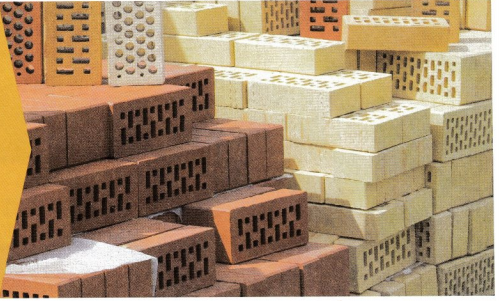
Answer:
The quadrilaterals around us in everyday life are tabletop, book, picture frame, door, baseball diamond, etc.
Explanation:
In the above-given question,
given that,
we found quadrilaterals in everyday life.
they are tabletop, book, photo frame, door, etc.
so we can also see quadrilaterals in many pictures.
3-ACT MATH PREVIEW
Math Modeling
Square It Up
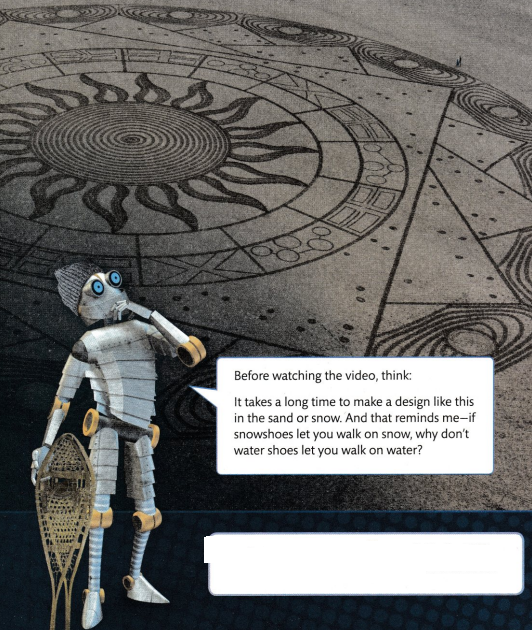
I can … model with math to solve a problem that involves using attributes of 2-D shapes to compare weights.
Lesson 15.1 Describe Quadrilaterals
Solve & Share
Fold a square piece of paper to make the fold lines as shown below. Find as many different quadrilaterals as you can using the fold lines and the edges of the square paper. Sketch each quadrilateral you find and describe it.
I can … identify quadrilaterals and use attributes to describe them.
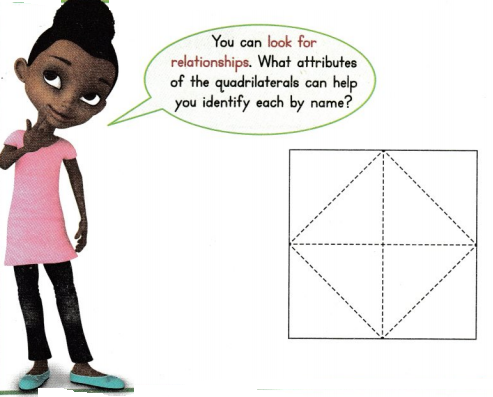
Look Back! Describe how you used what you know about quadrilaterals to identify the shapes.
Essential Question
What Are Some Attributes of Quadrilaterals?
Answer:
Some attributes of quadrilaterals are triangles, rhombus, and the square.
Explanation:
In the above-given question,
given that,
Fold a square piece of paper to make the fold lines.
if we fold the paper in an above-given way,
we can find some shapes.
the shapes are quadrilaterals, triangles, and rhombus.
Visual Learning Bridge
The welcome to Florida sign is a quadrilateral. How can you describe quadrilaterals?
An angle is formed when two sides of a polygon meet.
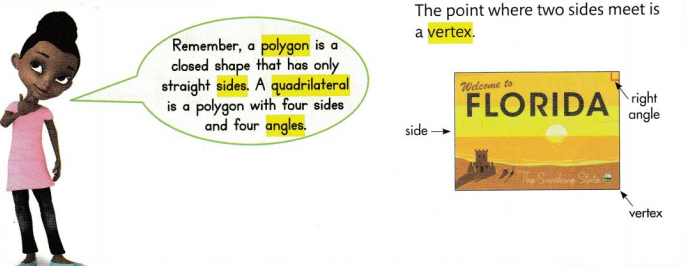
Some quadrilaterals have special names.

Convince Me! Make Sense and Persevere Draw a quadrilateral that is an example of one of the shapes listed in Box B. Name the shape. Then draw a quadrilateral that is NOT an example of a shape listed in Box B.
Answer:
The trapezoid is one example of the quadrilateral.
Explanation:
In the above-given question,
given that,
the shapes are trapezoid, parallelogram, rectangle, rhombus, and square.
among all these shapes,
a trapezoid is one example.
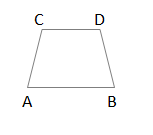
Another Example!
These are convex polygons. All angles point outward.

These are concave polygons. One or more angles point inward.

Guided Practice
Do You Understand?
Question 1.
This figure is a rectangle, but it is NOT a square. Why?
Answer:
The square has four right angles and all sides the same length.
Explanation:
In the above-given question,
given that,
the figure is a rectangle, but it is not a square because
the rectangle has four right angles or square corners.
but the square has four right angles and all sides the same length.
area of the square = s x s.
area of the rectangle = l x b.
Question 2.
Draw two different quadrilaterals that are NOT rectangles, squares, or rhombuses.
Answer:
The two different quadrilaterals are trapezoid and parallelogram.
Explanation:
In the above-given question,
given that,
the two different quadrilaterals that are not rectangles, squares, or rhombuses:
they are trapezoid and parallelogram.
a trapezoid has exactly one pair of sides on lines that never cross.
the parallelogram has opposite sides that are the same length.
opposite angles are the same size.
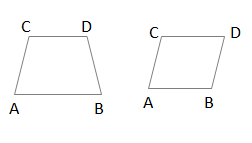
Do You Know How?
In 3-6, write as many special names as possible for each quadrilateral.
Question 3.

Answer:
The special name for the quadrilateral is a parallelogram.
Explanation:
In the above-given question,
given that,
the given figure is quadrilateral.
parallelogram is also a quadrilateral.
opposite sides are the same length.
opposite angles are the same size.
Question 4.

Answer:
The special name is a rectangle.
Explanation:
In the above-given question,
given that,
the shape is a rectangle.
the rectangle has four right angles or square corners.
area of the rectangle = l x b.
where l = length and b = breadth.
so the quadrilateral is a rectangle.
Question 5.

Answer:
The special name is a parallelogram.
Explanation:
In the above-given question,
given that,
the quadrilateral has two equal lengths and two equal breadths.
so the name is a parallelogram.
parallelogram is also a quadrilateral.
opposite sides are the same length.
opposite angles are the same size.
Question 6.

Answer:
The special name is square.
Explanation:
In the above-given question,
given that,
the quadrilateral has two equal lengths and two equal breadths.
so the name is square.
square is also a quadrilateral.
four right angles and all sides the same length.
Independent Practice
In 7-9, write as many special names as possible for each quadrilateral.
Question 7.

Answer:
The special name is a rectangle.
Explanation:
In the above-given question,
given that,
the quadrilateral has opposite sides that are the same length.
so the name is a rectangle.
the rectangle is also a quadrilateral.
opposite sides are the same length.
opposite angles are the same size.
Question 8.

Answer:
The special name is a trapezoid.
Explanation:
In the above-given question,
given that,
the quadrilateral has exactly one pair of sides.
so the name is a trapezoid.
trapezoid is also a quadrilateral.
exactly one pair of sides on lines that never cross.
Question 9.
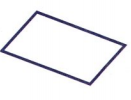
Answer:
The special name is a parallelogram.
Explanation:
In the above-given question,
given that,
the quadrilateral has two equal lengths and two equal breadths.
so the name is a parallelogram.
parallelogram is also a quadrilateral.
opposite sides are the same length.
opposite angles are the same size.
In 10, name all the possible quadrilaterals that fit the rule.
Question 10.
Has 2 pairs of opposite sides that are equal _______________
Answer:
The 2 pairs of opposite sides that are equal are parallelogram and rectangle.
Explanation:
In the above-given question,
given that,
the quadrilateral that has 2 pairs of opposite sides that are equal is a parallelogram and rectangle.
opposite sides are the same length.
opposite angles are the same size.
four right angles, or square corners.
so rectangle and parallelogram have 2 pairs of opposite sides that are equal.
Problem Solving
In 11 and 12, write the name that best describes the quadrilateral. Draw a picture to help.
Question 11.
Vocabulary A rectangle with all sides the same length is a _________.
Answer:
A rectangle with all sides the same length is a rhombus.
Explanation:
In the above-given question,
given that,
a rhombus has all sides the same length.
rhombus is a special parallelogram.
so a rectangle with all sides the same length is a parallelogram.
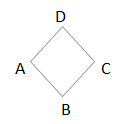
Question 12.
Vocabulary A parallelogram with four right angles is a __________
Answer:
A parallelogram with four right angles is a rectangle.
Explanation:
In the above-given question,
given that,
the rectangle has four right angles or square corners.
a rectangle is a special parallelogram.
a parallelogram with four right angles is a rectangle.
Question 13.
I am a quadrilateral with opposite sides the same length. Which quadrilaterals could I be?
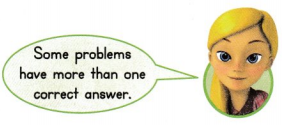
Answer:
The quadrilateral with opposite sides of th+e same length is a parallelogram.
Explanation:
In the above-given question,
given that,
the parallelogram has opposite sides that are the same length.
opposite angles are the same size.
so the quadrilateral with opposite sides of the same length is a parallelogram.
Question 14.
Higher Order Thinking Jae says that the figure on the left is a trapezoid. Carmen says that the figure on the right is a trapezoid. Who is correct? Explain.

Answer:
Yes, both of them are correct.
Explanation:
In the above-given question,
given that,
Jae says that the figure on the left is a trapezoid.
Carmen says that the figure o the right is a trapezoid.
a trapezoid has exactly one pair of sides on lines that never cross.
trapezoid is also a quadrilateral.
so both of them are correct.
Question 15.
Model with Math Sue bought a book for $12, two maps for $7 each, and a pack of postcards for $4. Use math you know, bar diagrams, equations, or properties of operations, to find Sue’s total cost.
Answer:
The total cost of Sue was $23.
Explanation:
In the above-given question,
given that,
Sue bought a book for $12, two maps for $7 each,
and a pack for $4.
12 + 7 + 4.
12 + 4 = 16.
16 + 7 = 23.
so the total cost of Sue was $23.
Question 16.
Algebra Angela drew 9 rhombuses and 6 trapezoids. She wants to find b, the total number of angles in her quadrilaterals. Explain how Angela can find b.
Answer:
The total number of angles in her quadrilaterals is
Explanation:
In the above-given question,
given that,
Algebra Angela drew 9 rhombuses and 6 trapezoids.
Assessment Practice
Question 17.
A square and a rhombus are shown at the right. Which attributes do these shapes always have in common? Select all that apply.
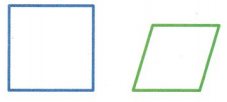
☐ Number of sides
☐ Side lengths
☐ Angle measures
☐ Right angles
☐ Number of angles
Answer:
The attributes of these shapes always have in common are the number of sides, side lengths, right angles.
Explanation:
In the above-given question,
given that,
A square and a rhombus are shown at the right.
rhombus has all sides the same length.
a rhombus is a special parallelogram.
a square has four angles and all sides the same length.
a square is a special parallelogram.
so the number of sides, side length, and right angles have the same attributes.
Lesson 15.2 Classify Shapes
Solve & Share
Sort the shapes below into two groups. Use colored pencils or crayons to color each group a different color. How did you sort the shapes? How are the shapes in both of your groups alike?
I can … classify shapes in several ways based on how they are alike and how they are different.
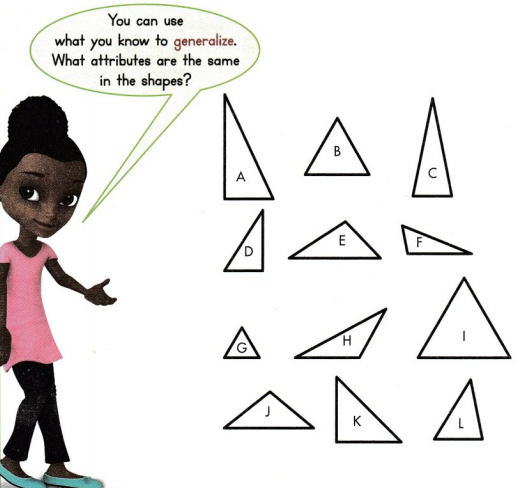
Look Back! What fraction of the triangles above have each attribute: all sides equal in length, no sides equal in length, exactly two equal angles, or one right angle?
Answer:
Triangle G, B, and I have all sides equal in length.
Triangle E, F, AND L have no sides equal in length.
Exactly one right angle is A, D, and K.
triangle B, C, I, and J have two equal angles.
Explanation:
In the above-given question,
given that,
there are 12 triangles.
the triangles are the names A, B, C, D, E, F, G, H, I, J, K, and L.
The triangles that have all sides equal in length are G, B.
the triangles that have no sides equal in length are E, F, and L.
the triangles that have exactly one right angle are A, D, and K.
the triangles have two equal angles is B, C, I, and J.
Essential Question
How Can You Describe Different Question Groups of Shapes?
Visual Learning Bridge
Ethan made two groups of polygons. How are the groups different? How are the groups alike?
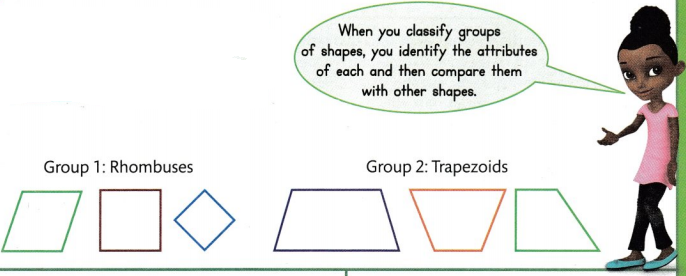
Here is one way the two groups are different
In Group 1, each polygon has sides that all are the same length.
In Group 2, each polygon has sides that are not all the same length.
Here are some ways the two groups are alike.
In Group 1 and Group 2, all of the polygons have 4 sides.
In Group 1 and Group 2, all of the polygons have 4 angles.
In Group 1 and Group 2, all of the polygons are quadrilaterals.
Convince Me! Construct Arguments Draw a quadrilateral that does not belong to either Group 1 or Group 2. Explain why it does not belong to either group.
Answer:
The quadrilateral that does not belong to either group 1 and group 2 is a rectangle.
Explanation:
In the above-given question,
given that,
in group 1 each polygon has sides that all are the same length.
In Group 2, each polygon has sides that are not all the same length.
In Group 1 and Group 2, all of the polygons have 4 sides.
In Group 1 and Group 2, all of the polygons have 4 angles.
In Group 1 and Group 2, all of the polygons are quadrilaterals.
so the quadrilateral that does not belong to either group 1 and group 2 is a rectangle.
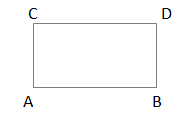
Guided Practice
Do You Understand?
Question 1.
Nellie drew a group of rectangles and a group of trapezoids. How are the shapes in each group different?
Answer:
The groups of rectangles and groups of trapezoids are different.
Explanation:
In the above-given question,
given that,
Nellie drew a group of rectangles and a group of trapezoids.
rectangles have four right angles or square corners.
a rectangle is a special parallelogram.
trapezoids have exactly one pair of sides on lines that never cross.
the trapezoid is also a quadrilateral.
so rectangles and trapezoids are different.
Question 2.
How are rectangles and trapezoids alike?
Answer:
The rectangles and trapezoids are alike.
Explanation:
In the above-given question,
given that,
rectangles have four right angles or square corners.
a rectangle is a special parallelogram.
trapezoids have exactly one pair of sides on lines that never cross.
the trapezoid is also a quadrilateral.
so rectangles and trapezoids are alike.
Question 3.
What larger group of polygons do all of Nellie’s shapes belong to?
Answer:
The larger group of polygons do Nellie’s shapes belong to rectangles and trapezoids.
Explanation:
In the above-given question,
given that,
Nellie drew a group of rectangles and a group of trapezoids.
rectangles have four right angles or square corners.
a rectangle is a special parallelogram.
trapezoids have exactly one pair of sides on lines that never cross.
the trapezoid is also a quadrilateral.
so rectangles and trapezoids belong to quadrilaterals.
Nellie’s shape belongs to quadrilaterals.
Do You Know How?
In 4-6, use the groups on the previous page.
Question 4.
Draw a shape that belongs to Ethan’s Group 1.
Answer:
The shape is a parallelogram, and square.
Explanation:
In the above-given question,
given that,
Ethan draws a shape that belongs to two groups.
in group 1 he draws 3 shapes.
they are parallelogram and square.
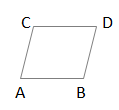
Question 5.
Draw a shape that belongs to Ethan’s Group 2.
Answer:
The shape is a trapezoid.
Explanation:
In the above-given question,
given that,
Ethan draws a shape that belongs to two groups.
in group 2 he draws 3 shapes.
they are different types of trapezoids.
the quadrilateral is also a trapezoid.
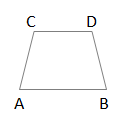
Question 6.
Why is there a square in Group 1?
Answer:
In group 1 there is a square because it has four right angles and all sides the same length.
Explanation:
In the above-given question,
given that,
Ethan draws a shape that belongs to two groups.
in group 1 he draws 3 shapes.
among the three shapes, one is square.
the area of the square = s x s.
where s = side.
square has four right angles and all sides the same length.
Independent Practice
In 7-11, use the groups below.

Question 7.
How are the shapes in Group 1 different from the shapes in Group 2?
Answer:
The shapes in group 1 different from the shapes in group 2.
Explanation:
In the above-given question,
given that,
in group 1 there are three pentagons.
the pentagons are the same with the edges have the same length.
in group 2 there are 3 pentagons.
the pentagons have different side lengths.
Question 8.
How are the two groups alike?
Answer:
The two groups are alike because they all are pentagons.
Explanation:
In the above-given question,
given that,
in group 1 all the pentagons have equal side lengths.
in group 1 there are 3 pentagons.
in group 2 all the pentagons have different side lengths.
in group 2 there are also 3 pentagons.
Question 9.
What larger group do all the shapes belong to?
Answer:
The shapes belong to the pentagons.
Explanation:
In the above-given question,
given that,
the larger group do all the shapes belong to pentagons.
there are 4 pentagons.
they have the same equal side lengths.
2 pentagons have different side lengths.
Question 10.
Draw a shape that could go in Group 2 but not Group 1.
Answer:
The shape is pentagon.
Explanation:
In the above-given question,
given that,
right pentagon belongs to group 2.
the polygon that has 5 sides is called a pentagon.
Question 11.
Draw a shape that could go in Group 1 but not Group 2.
Answer:
The shape that could go in group 1 is a trapezoid.
Explanation:
In the above-given question,
given that,
in group 1 there are 3 pentagons.
the 3 pentagons that have the same length.
i group 2 there are 3 trapezoids.
that have different side lengths.
Problem Solving
In 12-14, use the picture at the right.
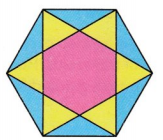
Question 12.
How are the yellow shapes and the blue shapes different? How are they alike?
Answer:
The blue and the yellow shapes are same because they all are triangles.
Explanation:
In the above-given question,
given that,
in the given figure
there is one hexagon.
there are 6 equilateral triangles.
there is 6 isosceles triangles.
they are different because they are equilateral and isosceles triangles.
Question 13.
Which larger group of polygons do the yellow and blue shapes belong to?
Answer:
The larger group of polygons do the yellow and blue shapes belong to triangles.
Explanation:
In the above-given question,
given that,
in the given figure
there is one hexagon.
there are 6 equilateral triangles.
there are 6 isosceles triangles.
so the larger group of polygons do the yellow and blue shapes belong to triangles.
6 + 6 = 12.
Question 14.
Does the pink shape belong to the group identified in Exercise 13? Explain.
Answer:
Yes, the pink shape belongs to the group identified in exercise 13.
Explanation:
In the above-given question,
given that,
the pink shape is a hexagon.
hexagon has 6 sides.
the six sides have the same side lengths.
so the pink shape belong to the group identified in exercise 13.
Question 15.
Draw a quadrilateral that is NOT a rectangle, a rhombus, or a square.
Answer:
The quadrilateral is a parallelogram.
Explanation:
In the above-given question,
given that,
the quadrilateral is a parallelogram.
opposite sides are the same length.
opposite angles are the same size.
so the quadrilateral is a parallelogram.
Question 16.
Todd bought a jacket for $57 and two maps for $9 each. What was the total cost?
Answer:
The total cost is $66.
Explanation:
In the above-given question,
given that,
Todd bought a jacket for $57.
two maps for $9 each.
57 + 9 = $66.
so the total cost is $66.
Question 17.
Use Appropriate Tools Victoria wants to make two same-sized rhombuses. What tool can she use? Explain.
Answer:
The tool is scale.
Explanation:
In the above-given question,
given that,
Victoria wants to make two same-sized rhombuses.
rhombus has all the sides the same length.
rhombus is a special type of special parallelogram.
Question 18.
Higher Order Thinking Jessalyn needs to find 3 × 3,4 × 6, and 7 × 2. She draws area models to solve the problem. What polygon group do her area models all belong to? Explain.
Answer:
The area models belong to square and rectangle.
Explanation:
In the above-given question,
given that,
Jessalyn needs to find 3 × 3,4 × 6, and 7 × 2.
3 x 3 = 9.
where the area of the square = s x s.
where s = side.
the area of the rectangle = l x b.
where l = length and b = breadth.
4 x 6 = 24.
7 x 2 = 14.
so the area models belong to squares and rectangles.
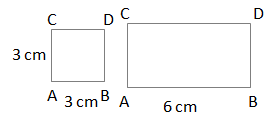
Assessment Practice
Question 19.
What is the name of a shape that is NOT always a rectangle, but is a quadrilateral?
A. Square
B. Triangle
C. Hexagon
D. Parallelogram
Answer:
The name of a shape that is not always a rectangle is triangle.
Explanation:
In the above-given question,
given that,
the quadrilateral is a square, hexagon, and parallelogram.
the polygon that has three sides is called triangle.
a quadrilateral that is not always a rectangle is triangle.
opposite sides are the same length.
opposite angles are the same size.
square has four right angles and all sides the same length.
Question 20.
Which shape could be sorted into a group of parallelograms or a group of rhombuses?
A. Square
B. Rectangle
C. Trapezoid
D. Hexagon
Answer:
Option B and option C is correct.
Explanation:
In the above-given question,
given that,
The shapes are square, rectangle, trapezoid, and hexagon.
four right angles and all sides the same length is a square.
rectangle has four right angles or square corners.
a rectangle is a special parallelogram.
a trapezoid has exactly one pair of sides on lines that never cross.
option B and option C is correct.
Lesson 15.3 Analyze and Compare Quadrilaterals
Solve & Share
Describe at least two attributes that are the same in all or some of these shapes. Describe two attributes that are different.
I can … analyze and compare quadrilaterals and group them by attributes.
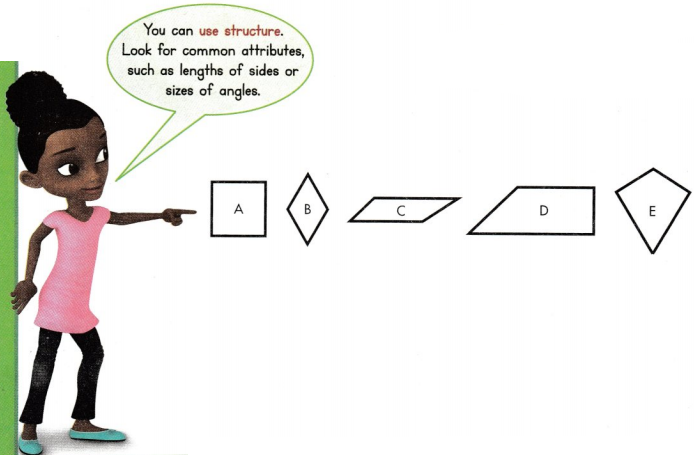
Look Back! Draw a quadrilateral that is different from all the quadrilaterals above. Tell how it is different.
Answer:
The quadrilateral that is different from all the quadrilaterals is diagram E.
Explanation:
In the above-given question,
given that,
the shapes are parallelogram and rhombus.
parallelogram has opposite sides are the same length.
opposite angles are the same size.
so the quadrilateral that is different from all the quadrilaterals is E.
Essential Question
How Can You Analyze bessed to Question and Compare Shapes?
Visual Learning Bridge
What are different ways you can classify the quadrilaterals shown below?
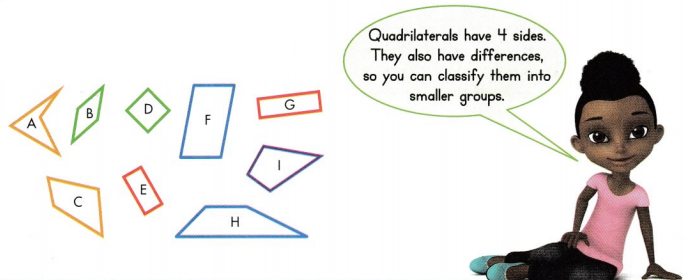
Shapes B, D, E, F, and G are also parallelograms. Each has two pairs of sides that have the same length.

Shapes D, E, and G are also rectangles. Each has 4 right angles.

Shapes B and D are parallelograms that are also rhombuses. Each has 4 equal-length sides.
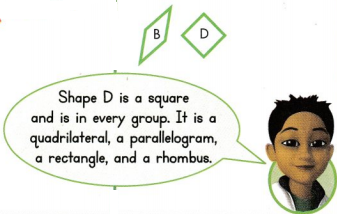
Convince Me! Reasoning Which of the shapes above can you cover with whole unit squares and not have any gaps or overlaps? What attributes do these shapes have in common?
Guided Practice
Do You Understand?
Question 1.
Which shape on the previous page is a rhombus but not a rectangle? Explain.
Answer:
The shape D is the rhombus but not a rectangle.
Explanation:
In the above-given question,
given that,
the shapes are rhombus, parallelogram.
shapes D, E, G are also rectangles.
each has 4 right angles.
Question 2.
Can you have a square trapezoid? Explain.
Answer:
Yes, the shape D is a square trapezoid.
Explanation:
In the above-given question,
given that,
the shapes are B, D, E, F, and G.
the shape D is a square trapezoid.
D, E, and G are rectangles.
so the shape D is a square trapezoid.
Do You Know How?
Question 3.
Which shapes on the previous page are not a parallelogram, rectangle, rhombus, or square?
Answer:
The shapes belong to the parallelogram, rectangle, rhombus, and square.
Explanation:
In the above-given question,
given that,
the shapes are parallelogram, rectangle, rhombus, square.
shape D is a square.
shape B is a parallelogram.
shape G is a rectangle.
so all the shape belongs to the parallelogram, rectangle, rhombus, and a square.
Question 4.
What attributes does a square have because it is always a rectangle?
Answer:
The square has four right angles and all sides the same length.
Explanation:
In the above-given question,
given that,
the square has four right angles and all sides the same length.
the rectangle is four right angles or square corners.
a rectangle is a special parallelogram.
square is a rectangle.
Independent Practice
In 5-9, list all the polygons shown at the right that fit each description. If there could be no such polygon, tell why.
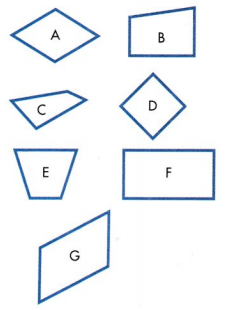
Question 5.
Is not a parallelogram
Answer:
The shape E is not a parallelogram.
Explanation:
In the above-given question,
given that,
a quadrilateral that has opposite sides are the same length.
opposite angles are the same size.
but the shape E does not have the opposite sides same length.
Question 6.
Is a quadrilateral but not a parallelogram or trapezoid
Answer:
The shapes B, F, A, and D are rectangle, rhombus, and square.
Explanation:
In the above-given question,
given that,
the parallelogram has opposite sides that are the same length.
opposite angles are the same size.
a trapezoid has exactly one pair of sides on lines that never cross.
so the shapes B, F, A, and D are rectangle, rhombus, and square.
Question 7.
Is a square and not a parallelogram
Answer:
The shapes A and D are square.
Explanation:
In the above-given question,
given that,
the square is the shape A and the shape D.
the shapes A and D are square and rhombus.
Question 8.
Is a rhombus and not a rectangle
Answer:
The shape D is a rhombus but not a rectangle.
Explanation:
In the above-given question,
given that,
the shape D is a rhombus.
but the shape D is not a rectangle.
so the shape D is a rhombus.
Question 9.
Is a parallelogram and not a rhombus
Answer:
The shape G is a parallelogram but not a rhombus.
Explanation:
In the above-given question,
given that,
the shape G is a parallelogram.
the shape G is not a rhombus.
the parallelogram has opposite sides that are the same length.
so the shape G is a parallelogram but not a rhombus.
Problem Solving
Question 10.
Cy put blocks 1 and 2 together to make a new shape. How are the blocks he used alike? How are they different?

Answer:
The new shape formed is a trapezoid.
Explanation:
In the above-given question,
given that,
Cy put blocks 1 and 2 together to make a new shape.
shape 1 is a parallelogram.
shape 2 is a trapezoid.
by joining the two shapes we will get the other shape.
so the new shape formed is a trapezoid.
Question 11.
Reasoning Explain which of the shapes at the right you can cover with whole unit squares and not have any gaps or overlaps.
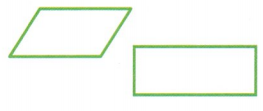
Answer:
The shape rectangle can cover with whole unit squares.
Explanation:
In the above-given question,
given that,
the shape rectangle is filled with squares.
they have given the two shapes.
they are parallelogram and rectangle.
so the shape rectangle can cover with whole unit squares.
Question 12.
Higher Order Thinking Draw a quadrilateral with no sides the same length. Tell why it is not a parallelogram.
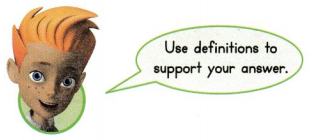
Answer:
The quadrilateral with no sides the same length is not a parallelogram is a trapezoid.
Explanation:
In the above-given question,
given that,
quadrilaterals have special names.
a trapezoid has exactly one pair of sides on lines that never cross.
the parallelogram has opposite sides that are the same length.
opposite angles are the same size.
so the quadrilateral with no sides the same length is not a parallelogram is a trapezoid.
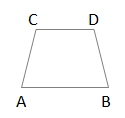
Question 13.
Sam needs 25 minutes to get ready and 15 minutes to bike to swim practice. Practice starts at 4:00 P.M. What time should Sam start getting ready?
Answer:
Sam starts getting ready at 3:20 P.M.
Explanation:
In the above-given question,
given that,
Sam needs 25 minutes to get ready and 15 minutes to bike to swim practice.
practice starts at 4:00 P.M.
25 + 15 = 40.
so Sam starts getting ready at 3:20 P.M.
Assessment Practice
Question 14.
Look at these polygons.

Part A
Name one attribute that all 4 polygons have.
Answer:
The 4 polygons that have the same attribute is the right angles.
Explanation:
In the above-given question,
given that,
The given polygons are rectangle, trapezoid, parallelogram.
the shape A and B are rectangles.
the shape C is trapezoid.
the shape D is a parallelogram.
so the 4 polygons that have the same attribute are the right angles.
Part B
Name an attribute that both A and D have that B and C do not.
Answer:
The attribute that both A and D have is the opposite sides have the same length.
Explanation:
In the above-given question,
given that,
the shape A is a rectangle.
the shape D is a parallelogram.
the rectangle has four right angles or square corners.
the rectangle has a special parallelogram.
the parallelogram has opposite sides that are the same length.
opposite angles are the same size.
so the attribute that both A and D have is the opposite sides have the same length.
Lesson 15.4 Problem Solving
Precision
Solve & Share
Draw shapes that match all of these clues. Use math words and numbers correctly to name each shape and explain how your shapes match the clues. Clue 1: 1 am a polygon with 4 sides.
Clue 2: I am a polygon with 4 right angles.
Clue 3: My area is 12 square units.
I can … be precise when solving math problems.
Answer:
The 1st shape is a rectangle.
the 2nd shape is a square.
the 3rd shape is a rectangle.
Explanation:
In the above-given question,
given that,
the shape that has 4 sides is a rectangle.
the shape that has 4 right angles is the square.
the area is 12 sq units.
area of a rectangle = l x b.
where l = length, and b = breadth.
area = 3 x 4.
area = 12 sq units.
so the shape formed is a rectangle.
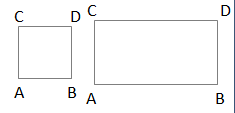
Thinking Habits
Be a good thinker! These questions can help you.
- Am I using numbers, units, and symbols appropriately?
- Am I using the correct definitions?
- Am I calculating accurately?
- Is my answer clear?
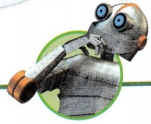
Look Back! Be Precise How did you use math terms or numbers to make your explanation clear?
Essential Question
How Can You Be Precise When Solving Math Problems?
Visual Learning Bridge
What shapes can you draw for this riddle?
I am a polygon with 4 sides.
I have 4 right angles.
My opposite sides are equal in length.
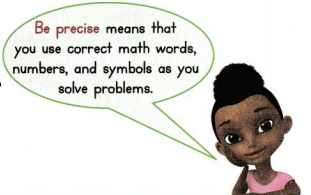
What do I need to do to solve this problem?
I will read the given information and use it to draw shapes that match the description.
Answer:
The shape formed is a rectangle.
Explanation:
In the above-given question,
given that,
I am a polygon with 4 sides.
I have 4 right angles.
My opposite sides are equal in length.
the rectangle has 4 right angles or square corners.
so the shape formed with the given polygon is a rectangle.
How can I be precise in solving this problem?
I can
- correctly use the information given.
- use pictures or objects to identify possible answers.
- decide if my answer is clear and appropriate.
Here’s my thinking…
I know that the shape is a 4-sided polygon with 4 right angles and opposite sides that are equal in length.
I can draw shapes that match all of the clues. Then I can name each shape.

Each of the shapes has 4 sides, 4 right angles, and opposite sides that are equal in length.
Convince Me! Be Precise Draw a shape for this riddle. Explain how it matches the clues.
I am a polygon with 4 sides.
None of my angles are right angles.
None of my sides is the same length.
Answer:
The shape is a trapezoid.
Explanation:
In the above-given question,
given that,
I am a polygon with 4 sides.
None of my angles are right angles.
None of my sides is the same length.
a trapezoid has exactly one pair of sides on lines that never cross.
so the shape formed is a trapezoid.
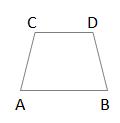
Guided Practice
Be precise. Carefully Students in Mr. Tesla’s class drew pictures of their favorite consider and use the shapes. Jackie made a polygon with 4 sides. It has 4 right information you are given angles, but not all of the shape’s sides are the same length.
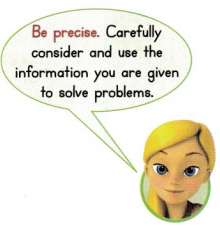
Question 1.
What math words and numbers are important in this problem?
Answer:
The shape formed is a trapezoid.
Explanation:
In the above-given question,
given that,
Jackie made a polygon with 4 sides.
It has 4 right information you are given angles, but not all of the shape’s sides are the same length.
a trapezoid has exactly one pair of sides on lines that never cross.
so the shape formed is a trapezoid.
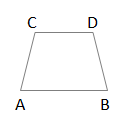
Question 2.
Draw and name the type of polygon Jackie made.
Answer:
The shape formed is a trapezoid.
Explanation:
In the above-given question,
given that,
Jackie made a polygon with 4 sides.
It has 4 right information you are given angles, but not all of the shape’s sides are the same length.
a trapezoid has exactly one pair of sides on lines that never cross.
so the shape formed is a trapezoid.

Question 3.
How can you check to make sure your answer is clear and correct?
Answer:
By using the formulas we can make sure.
Explanation:
In the above-given question,
given that,
Jackie made a polygon with 4 sides.
It has 4 right information you are given angles, but not all of the shape’s sides are the same length.
a trapezoid has exactly one pair of sides on lines that never cross.
so the shape formed is a trapezoid.
Independent Practice
Be Precise Students in Mrs. Edison’s class designed a mural to show what they have learned about quadrilaterals. Ethan made a shape with opposite sides that are the same length.
Question 4.
What math words and numbers are important in this problem?
Answer:
The shape Ethan formed is rectangle and parallelogram.
Explanation:
In the above-given question,
given that,
Students in Mrs. Edison’s class designed a mural to show what they have learned about quadrilaterals.
Ethan made a shape with opposite sides that are the same length.
a rectangle has 4 right angles or square corners.
the parallelogram has opposite sides that are the same length.
opposite angles are the same size.
so the shape Ethan formed is a rectangle and a parallelogram.
Question 5.
Draw a possible polygon that Ethan could have made. Is there more than one type of quadrilateral that would correctly match the description? Explain.
Answer:
Yes, there is more than one type of quadrilateral is rectangle and parallelogram.
Explanation:
In the above-given question,
given that,
Students in Mrs. Edison’s class designed a mural to show what they have learned about quadrilaterals.
Ethan made a shape with opposite sides that are the same length.
a rectangle has 4 right angles or square corners.
the parallelogram has opposite sides that are the same length.
opposite angles are the same size.
so the shape Ethan formed is a rectangle and a parallelogram.
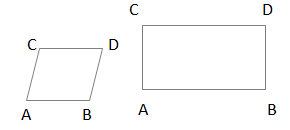
Question 6.
How can you check to make sure your answer is clear and correct?
Answer:
By using the formulas we can make sure.
Explanation:
In the above-given question,
given that,
Ethan made a shape with opposite sides that are the same length.
a rectangle has 4 right angles or square corners.
the parallelogram has opposite sides that are the same length.
opposite angles are the same size.
so the shape Ethan formed is a rectangle and a parallelogram.
Problem Solving
Performance Task
Crazy Quilts Each student in Ms. Beardon’s art class is designing a panel for a crazy quilt. Students can use different colors, but each panel will be the same shape. The attributes of the panel design are as shown at the right.
- 4 equal sides
- 4 right angles
Draw and name a shape to match this description. Answer Exercises 7-10 to solve the problem.
Question 7.
Make Sense and Persevere What do you know? What are you asked to do?
Answer:
The shape formed is square.
Explanation:
In the above-given question,
given that,
the polygon has 4 equal sides.
the polygon has 4 right angles.
square has 4 right angles and all sides the same length.
so the attributes match the given attributes.
so the shape formed is square.
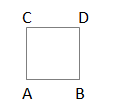
Question 8.
Be Precise What math terms and numbers can help you solve the problem?
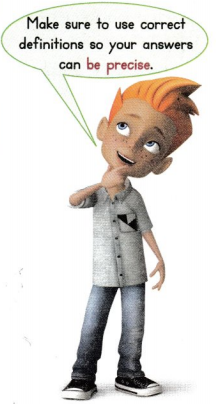
Answer:
Yes, we are using the correct answers.
Explanation:
In the above-given question,
given that,
we are using the correct answers.
Question 9.
Use Appropriate Tools Choose tools to help you solve this problem. Then draw and name a possible panel design.
Answer:
Question 10.
Critique Reasoning Tabby followed Ms. Beardon’s directions and made a quilt panel with the shape shown below. Did she follow directions correctly? Explain.

Answer:
Yes, she follows the directions correctly.
Explanation:
In the above-given question,
given that,
Ms. Beardon’s directions and make a quilt panel.
Ms. Beardon said to draw the rectangle.
so the tabby followed his instructions and draw the rectangle.
so she follows the directions correctly.
Topic 15 Fluency Practice Activity
Follow the path
Shade a path from START to FINISH. Follow the products and quotients that are even numbers. You can only move up, down, right, or left.
I can … multiply and divide within 100.
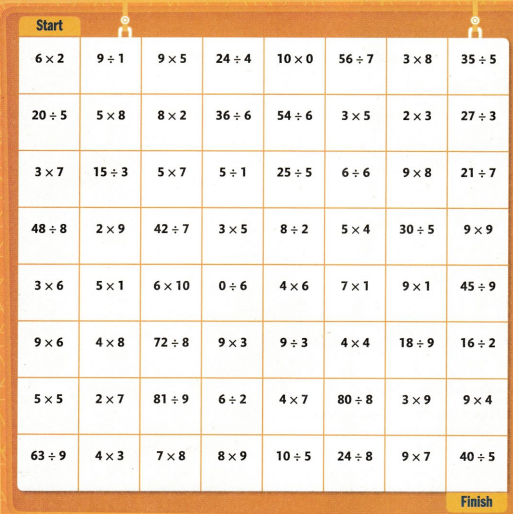
Topic 15 Vocabulary Review
Word List
- square rhombus
- angle
- parallelogram
- polygon
- quadrilateral
- rectangle
- rhombus
- right angle
- square
- trapezoid
Understand Vocabulary
Circle all the terms that match each description.
Question 1.
A quadrilateral
square
rectangle
trapezoid
polygon
Answer:
A quadrilateral is a polygon.
Explanation:
In the above-given question,
given that,
the terms are square, rectangle, trapezoid, and polygon.
a polygon is a closed shape that has only straight sides.
a quadrilateral is a polygon with four sides and four angles.
so a quadrilateral is a polygon.

Question 2.
A polygon
angle
quadrilateral
rectangle
square
Answer:
A polygon is a quadrilateral.
Explanation:
In the above-given question,
given that,
the terms are polygon, angle, quadrilateral, rectangle, and square.
a polygon is a closed shape that has only straight sides.
a quadrilateral is a polygon with four sides and four angles.
so a polygon is a quadrilateral.

Question 3.
A polygon with 4 right angles
square
trapezoid
rhombus
rectangle
Answer:
A polygon with 4 right angles is a square.
Explanation:
In the above-given question,
given that,
the terms are square, trapezoid, rhombus, and rectangle.
square has 4 right angles and all sides the same length.
area of a square = s x s.
where s = side.
so a polygon with 4 right angles is a square.

Question 4.
A parallelogram
rhombus
triangle
rectangle
trapezoid
Answer:
A parallelogram is a rhombus.
Explanation:
In the above-given question,
given that,
the terms are rhombus, triangle, rectangle, and trapezoid.
rhombus has all sides the same length.
rhombus is a special parallelogram.
so parallelogram is a rhombus.

For each term, draw an example and a nonexample.
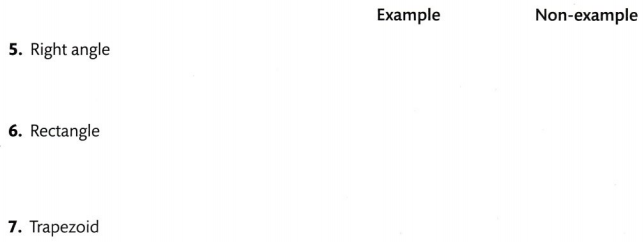
Answer:
The example of the right angle is square.
Rectangle has 4 right angles or square corners.
A trapezoid has exactly one pair of sides on lines that never cross.
Explanation:
In the above-given question,
given that,
the terms are right angle, rectangle, trapezoid.
square has 4 right angles and all sides the same length.
the rectangle has 4 right angles or square corners.
a trapezoid has exactly one pair of sides on lines that never cross.
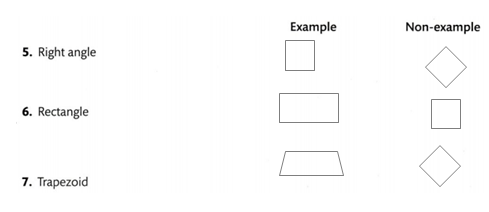
Use Vocabulary in Writing
Question 8.
Use at least 3 terms from the Word List to explain why a square is a rectangle.
Answer:
Yes, the square is a rectangle.
Explanation:
In the above-given question,
given that,
the terms are right angles, equal side lengths.
so the square is also a rectangle.
square has four right angles and all sides the same length.
rectangles have four right angles or square corners.
Topic 15 Reteaching
Set A pages 585-588
You can draw quadrilaterals and describe them by their attributes.
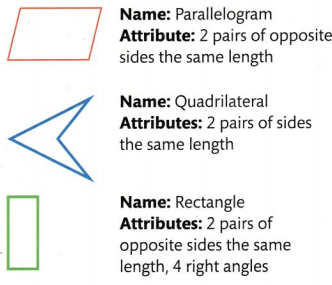
Remember that a polygon with 4 sides is a quadrilateral
In 1-3, draw the shapes named or described below and describe their attributes.
Question 1.
Trapezoid
Answer:
Attributes: exactly one pair of sides on lines that never cross.
Explanation:
In the above-given question,
given that,
a trapezoid has exactly one pair of sides on lines that never cross.
trapezoid is also a quadrilateral.
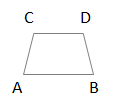
Question 2.
Rhombus
Answer:
Attributes: all sides the same length.
Explanation:
In the above-given question,
given that,
rhombus has all sides the same length.
a rhombus is a special parallelogram.
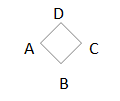
Question 3.
A quadrilateral that is NOT a trapezoid, parallelogram, rectangle, rhombus, or square.
Answer:
A quadrilateral is not a trapezoid, a parallelogram, rectangle, rhombus, and square is the triangle.
Explanation:
In the above-given question,
given that,
a shape that has 3 sides is a triangle.
area of the triangle = 2(l + b).
where l = length, and b = breadth.
Set B pages 589-592
How are the shapes in Groups 1 and 2 different? How are they alike?
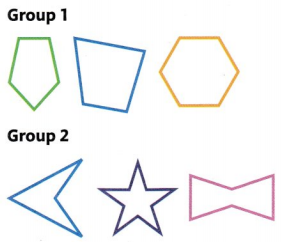
The shapes in the groups are different because in Group 1, all shapes are convex. In Group 2, all shapes are concave.
The shapes in both groups are alike because they all have straight lines and are closed. Therefore, they all are polygons.
Remember that all of the shapes in these groups have something in common.
In 1 and 2, use the groups below.
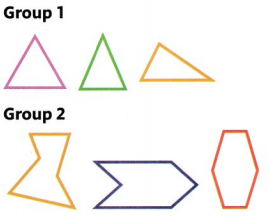
Question 1.
How are the shapes in Groups 1 and 2 different?
Answer:
In group 1 the figures are triangles.
in group 2 the figures are hexagons.
Explanation:
In the above-given question,
given that,
in group 1 the shapes are triangles.
in group 2 the shapes are hexagons.
so triangles and hexagons are different.
Question 2.
How are the shapes in Groups 1 and 2 alike?
Answer:
The shapes in groups 1 and 2 are alike when the shapes are divided.
Explanation:
In the above-given question,
given that,
in group 1 the shapes are triangles.
in group 2 the shapes are hexagons.
when the shapes in group 2 are divided into parts.
they form triangles.
so the shapes in group 1 and group 2 are alike.
Set C pages 593-596
All of the shapes below have 4 sides, so they are quadrilaterals. Some quadrilaterals can be classified into multiple groups.
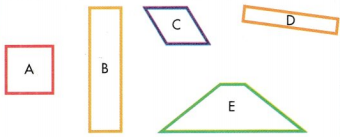
Parallelograms have 2 pairs of sides that have the same length. Shapes A, B, C, and D are parallelograms.
Rhombuses have 4 equal-length sides. Shapes A and C are rhombuses.
Rectangles have 2 pairs of sides that have the same length and 4 right angles. Shapes A, B, and D are rectangles.
Squares have 4 equal-length sides and 4 right angles. Shape A is a square.
Trapezoids have 1 pair of sides on lines that do not cross. Shape E is a trapezoid.
Remember that quadrilaterals with different names can have some of the same attributes.
In 1-4, list all the polygons that fit the given attributes.
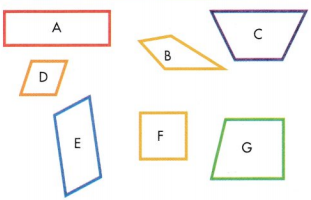
Question 1.
Has at least 2 right angles but is not a rectangle
Answer:
The shape F is a square.
Explanation:
In the above-given question,
given that,
they have given the 7 polygons.
the polygons are rectangle, rhombus, square, and trapezoid.
square has 4 right angles.
so the shape F has 2 right angles.
Question 2.
Has pairs of sides the same length but is not a rectangle
Answer:
The shape D has the pairs of sides the same length but is not a rectangle.
Explanation:
In the above-given question,
given that,
they have given the 7 polygons.
the polygons are rectangle, rhombus, square, and trapezoid.
Rhombus has all sides the same length.
so the shape D has the pairs of sides the same length but is not a rectangle.
Question 3.
Is a quadrilateral with no right angles
Answer:
The shapes D and B are quadrilaterals with no right angles.
Explanation:
In the above-given question,
given that,
they have given the 7 polygons.
the polygons are rectangle, rhombus, square, and trapezoid
the shape D is a parallelogram.
the shape B is a rhombus.
the parallelogram has opposite sides that are the same length.
opposite angles are the same size.
Question 4.
Has 4 sides of the same length but is not a square
Answer:
The shape B has 4 sides of the same length but it not a square.
Explanation:
In the above-given question,
given that,
they have given the 7 polygons.
the polygons are rectangle, rhombus, square, and trapezoid.
The shape B is the rhombus.
rhombus has all sides the same length.
so the shape B has 4 sides of the same length.
Set D pages 597-600
Think about these questions to help you attend to precision.
Thinking Habits
- Am I using numbers, units, and symbols appropriately?
- Am I using the correct definitions?
- Am I calculating accurately?
- Is my answer clear?
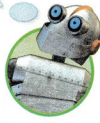
Remember to consider all parts of the question.
Anton drew a quadrilateral with 4 sides the same length and 4 right angles.
Question 1.
What quadrilateral did he draw?
Answer:
Anton drew a quadrilateral that is a square.
Explanation:
In the above-given question,
given that,
Anton drew a quadrilateral with 4 sides of the same length and 4 right angles.
square has four right angles and all sides the same length.
so Anton draws the shape that is a square.
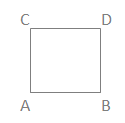
Question 2.
Is there any other shape that he could have drawn? Explain.
Answer:
No, he cannot draw.
Explanation:
In the above-given question,
given that,
Anton drew a quadrilateral with 4 sides of the same length and 4 right angles.
the rectangle has four right angles or square corners.
square has the four right and all sides the same length.
Topic 15 Assessment Practice
Question 1.
What other category does a parallelogram fall under?
A. Quadrilateral; because it has 4 right angles
B. Square; because it has 4 sides
C. Quadrilateral; because it has 4 sides
D. Rhombus; because all 4 sides are the same length
Answer:
Option D is correct.
Explanation:
In the above-given question,
given that,
a rhombus has all sides the same length.
because the rhombus has all 4 sides the same length.
rhombus comes under parallelogram.
so option D is correct.
Question 2.
Use the words in the box below. Write the names for the shapes in the correct columns.
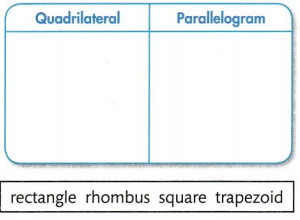
Answer:
Quadrilateral comes under trapezoid.
rhombus, square, and rectangle come under parallelogram.
Explanation:
In the above-given question,
given that,
the shapes are rectangle, rhombus, square, and trapezoid.
the rectangle has four right angles or square corners.
rhombus has all sides the same length.
square has four right angles and all sides the same length.
so quadrilateral comes under trapezoid.
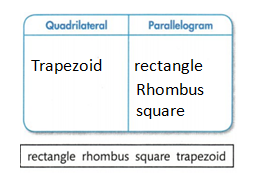
Question 3.
Name and draw a picture of a concave polygon with 4 sides.
Answer:
The trapezoid comes under a concave polygon.
Explanation:
In the above-given question,
given that,
concave polygon means that the sides come inside.
that means some of the sides come inside and also outside.
trapezoid comes under a concave polygon.
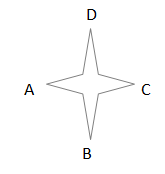
Question 4.
What are the possible shapes a parallelogram with 4 right angles could be?
Answer:
The possible shapes that come under a parallelogram with 4 right angles are a rectangle and a square.
Explanation:
In the above-given question,
given that,
the possible shapes a parallelogram with 4 right angles.
the rectangle has four right angles or square corners.
square has four right angles and all sides the same length.
Question 5.
The shapes are sorted into two groups, circled and not circled. How are the shapes in the two groups different?
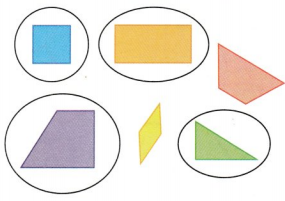
Answer:
The circled shapes come under a parallelogram.
the not circled shapes come under quadrilateral.
Explanation:
In the above-given question,
given that,
the shapes are sorted into two groups.
the groups are circled and not circled.
the circled groups come under parallelogram.
the not circled shapes come under quadrilateral.
Question 6.
Select all true statements.
☐ A trapezoid is a parallelogram.
☐ A parallelogram is a quadrilateral.
☐ A square is a rhombus.
☐ A triangle is a quadrilateral.
☐ A square is a rectangle.
Answer:
A parallelogram is a quadrilateral.
A square is a rhombus.
Explanation:
In the above-given question,
given that,
the true statements are:
a parallelogram is a quadrilateral.
a square is a rhombus.
a parallelogram has opposite sides are the same length.
opposite angles are the same size.
rhombus has all sides the same length.
square has 4 right angles and all sides the same length.
Question 7.
What two quadrilaterals did Kim use to make the rug design? What do the shapes have in common?
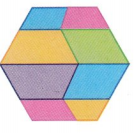
Answer:
The two quadrilaterals are parallelogram and trapezoid.
the two shapes that have in common side lengths.
Explanation:
In the above-given question,
given that,
Kim uses to make the rug design.
the two quadrilaterals are parallelogram and trapezoid.
the parallelogram has opposite sides are the same length, opposite angles are the same size.
a trapezoid has exactly one pair of sides on lines that never cross.
Question 8.
Look at each group.
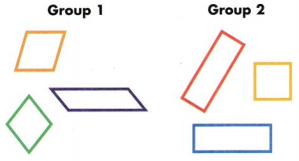
A. How are the two groups alike?
Answer:
The two groups are alike when the opposite sides are equal.
Explanation:
In the above-given question,
given that,
In group 1 the shapes are rhombus and parallelogram.
the parallelogram has opposite sides that are the same length.
in group 2 the shapes are square and rectangle.
square has four right angles and all sides the same length.
a square is a special parallelogram.
so the two groups are alike.
B. How are the two groups different?
Answer:
The two groups are different because rectangle and square have right angles.
Explanation:
In the above-given question,
given that,
In group 1 the shapes are rhombus and parallelogram.
the parallelogram has opposite sides that are the same length.
in group 2 the shapes are square and rectangle.
square has four right angles and all sides the same length.
rectangle and square have 4 right angles.
so they are different.
Question 9.
Which statement must be true about a rectangle?
A. It is a parallelogram.
B. It is a square.
C. It is a trapezoid.
D. It is a rhombus.
Answer:
Option A is correct.
Explanation:
In the above-given question,
given that,
the rectangle is a parallelogram.
the rectangle has four right angles or square corners.
so option A is correct.
Question 10.
Is a square always a rhombus? Explain.
Answer:
No, a square does not form a rhombus.
Explanation:
In the above-given question,
given that,
square has all 4 sides the same length and has 4 right angles.
rhombus has all 4 sides equal in length.
rhombus does not have the right angles.
so square does not form a rhombus.
Question 11.
Name and draw a quadrilateral that is NOT a rectangle or rhombus. Is there another shape you could have drawn? Explain.
Answer:
The other shape is a square.
Explanation:
In the above-given question,
given that,
the square has all four sides equal length.
all four sides have right angles.
so the quadrilateral that is not a rectangle or rhombus is a square.
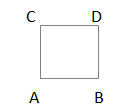
Topic 15 Performance Task
Pet Tags Amelia and Bryce work at a pet store that sells pet identification tags in many shapes. The Pet Tags diagram shows the different shapes available.
Use the Pet Tags art to answer Questions 1-4.
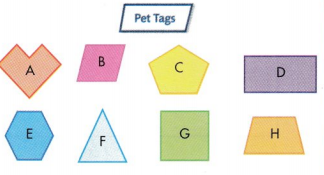
Question 1.
A customer asks Amelia if the store has any pet tags that are concave. How should Amelia respond?
Answer:
The shape A is concave.
Explanation:
In the above-given question,
given that,
A customer asks Amelia if the store has any pet tags that are concave.
the concave shape has all the sides and one side come inside.
so the shape A is concave.
Question 2.
Another customer asks Bryce which pet tags have 2 pairs of equal-length sides and are quadrilaterals. Which tags have these attributes? Include the common name of each shape.
Answer:
The shapes B and D have 2 pairs of equal-length sides are parallelogram.
Explanation:
In the above-given question,
given that,
Another customer asks Bryce which pet tags have 2 pairs of equal length sides are quadrilaterals.
the shape B is a parallelogram.
the parallelogram has opposite sides that are the same length.
opposite angles are the same size.
so the rectangle and parallelogram have 2 pairs of equal-length sides are parallelogram.
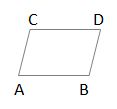
Question 3.
The store owner wants to mark for sale any pet tags that are not rectangles. Which tags should she mark for sale, and what shapes are they?
Answer:
The shapes are A, C, E, F, and H are not rectangles.
Explanation:
In the above-given question,
given that,
the store owner wants to mark for sale and any pet tags are not rectangles.
the shape A is a concave polygon.
the shape C is a pentagon.
the shape E is a hexagon.
the shape F is a triangle.
the shape H is a trapezoid.
Question 4.
The owner asks Bryce to group the tags to show which ones have at least 1 pair of equal-length sides. Complete the table with the pet tag labels.
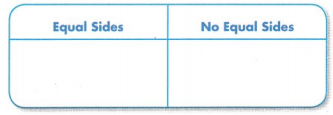
Answer:
The shapes B and G have at least 1 pair of equal-length sides.
Explanation:
In the above-given question,
given that,
the shapes Rhombus, triangle, and square have equal side lengths.
the shapes trapezoid, parallelogram does not have equal side lengths.
the shape B is a parallelogram.
the shape G is a square.
so the shapes B and G have at least 1 pair of equal-length sides.
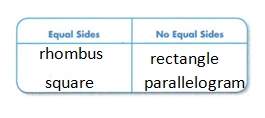
Question 5.
Use the Pet Tags diagram and the Tag Sort table to answer the questions in Part A and Part B.
Amelia sorts some of the pet tags into two different groups.
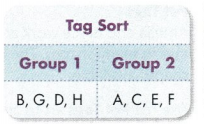
Part A
How are the groups different?
Answer:
The groups are different according to their shapes.
Explanation:
In the above-given question,
given that,
in group A the shapes are trapezoid, rectangle, rhombus, and square.
they have the sidelengths and right angles.
in group B the shapes are pentagon, hexagon, and trapezoids.
they are concave polygons.
so the groups are different according to their shapes.
Part B
How are the groups alike?
Answer:
The two groups are alike when they have the same angles.
Explanation:
In the above-given question,
given that,
in group A the shapes are trapezoid, rectangle, rhombus, and square.
they have the sidelengths and right angles.
in group B the shapes are pentagon, hexagon, and trapezoids.
they are concave polygons.
so the groups are alike when they have the same angles.
Use the Pet Tags diagram to answer Questions 6 and 7.
Question 6.
A customer says she wants to buy a pet tag that is a rhombus and a rectangle. What tag does she want? Explain.
Answer:
The tags B and D are rhombus and a rectangle.
Explanation:
In the above-given question,
given that,
A customer says she wants to buy a pet tag that is a rhombus and a rectangle.
the shape B is a rhombus.
the shape D is a rectangle.
rhombus has all sides the same length.
the rectangle has the opposite sides the same length and four right angles.
so the tags B and D are the rhombus and a rectangle.
Question 7.
Design a new pet tag that has 2 pairs of sides the same length, but that is not a rectangle or a rhombus. Explain the shape you drew.
Answer:
I draw the shape that is a square.
Explanation:
In the above-given question,
given that,
design a new pet tag that has 2 pairs of sides the same length, but is not a rectangle.
the shape is a square.
square has all the sides the same length and all four angles are right angles.
so the pet tag is G.
